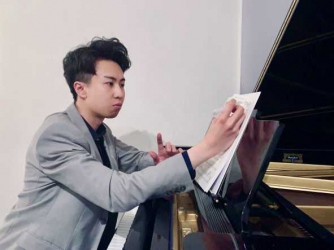Details
St Mary's Church
Church Street
Aylesbury
Buckinghamshire
HP20 2JJ
England
Programme
Ludwig van Beethoven – Fantasia in G minor, Op.77
Aleksandr Scriabin – 2 Poèmes, Op.63
Richard Stoker – A poet’s notebook Op.19
Cyril Scott – Poems
Franz Schubert – Gretchen am Spinnrade, D.118
Franz Schubert – Der Wanderer, D.489
Franz Schubert – Erlkönig, D.328
Performers
Lance Mok – piano
Other concerts in this Series (+)
Programme Note
Programme notes
Today’s programme, titled “Poesy”, is a journey through a spectrum of music differently related to poems, from those only evoking the essence of poetry to pieces that grew out of words in the form of song transcriptions. How much can music say when its words are taken away?
Ludwig van Beethoven (1770 – 1827)
A fantasia is a work in a very free composition style, using contrasts in tempo, style, keys and invention. Carl Czerny, a student of Beethoven, said that the Fantasia was a faithful portrayal of the way that Beethoven used to improvise. It starts sternly before moving through many keys and tempos to present a rich variety of different musical ideas. Relatively late in the piece it moves to an Allegretto in B major and then develops a set of variations on the theme. The work itself thus moves from the formal g minor section to a cheerful conclusion.
The origin of Beethoven’s Fantasia, Op. 77 has always been a source of heated scholarly debate but there is no question that this is the closest sample we have to his style of improvisation on the keyboard. The Fantasy is divided into two halves. The fragmentary first never settles in one key but goes through long stretches of modulations that, much like a Greek epic, brings the music through strange lands and seas; while the second is a theme-andvariations based on an 8-bar phrase in B major. The work closes with a coda which brings back improvisatory figures from the opening but is immediately shut off by a humorous gesture.
Alexander Scriabin (1871 – 1915)
Scriabin’s poèmes are a genre of piano music of his own invention. Their lack of narratives, similar to the Symbolist poetry he was fond of, emphasises colours and nuances. The 2 poèmes, Op. 63, titled “Masques” (Masks) and “Étrangeté” (Strangenss), employ non-traditional syntax and concise classical structures (each lasting around a minute) typical of his late style. Scriabin’s earliest known works date from when he was 14, modelling his music and his lifestyle on that of Chopin, with the piano a central part of the drawing room. At age 28, he wrote his first two poemes, thereby introducing a new form to the piano repertoire. He had by now left his wife, his four children and Russia, to live in Europe with a new admirer. Stylistically, chords previously thought only passing or decorative became central to his sound world. Scriabin planned to write huge and significant works and, between these efforts, produced a steady output of miniatures - tiny concentrated distinctive musical jewels. He applied the word ‘poème’ both to ground-breaking symphonic pieces and to the extended series of thirty-four little piano pieces, written over more than a decade and often grouped into little sets. Scriabin died at age 43 and one wonders what new work he might have composed had he lived longer.
Richard Stoker (1938 – 2021)
The six pieces in Stoker’s A Poet’s Notebook, Op. 19b are each inspired by a genre of poetry. Despite their brevity, these miniatures encompass a wide range of moods in a language close to that of Benjamin Britten. The collection is almost cast in an arch form. On the two ends are the lyrical “Ballad” and “Ode”, contrasted by the wittiness in “Epigram” and “Parody”. In the centre are two markedly different pieces: the sad and dignified “Elegy” and the excitingly satirical “Lampoon”.
Cyril Scott (1879 – 1970)
Scott is a composer, poet, and writer. He wrote his suite for piano titled 5 Poems in 1912 first and then wrote poems for each of the pieces of the cycle. The poems and the music are complete works in themselves but can also be performed together. His experiment in free rhythm and exposure to the Impressionist sound-world of his time is apparent in the flexible metres and colourful harmonies these pieces employ. The odd-numbered pieces in the five are imbued with colourful tone paintings: the gently swaying chords in “Poppies”, the tolling chorus of consonant and dissonant “Bells”, and the chirping “Paradise-birds”; while the lyricism in “The Garden of SoulSympathy” hints at eastern inspiration and “The Twilight of the Year” explores darker timbres and more modern harmonies.
Franz Schubert (1797 – 1828)
Gretchen am Spinnrade (Gretchen at the Spinning Wheel), Der Wanderer (The Wanderer), and Erlkönig (Erlking) are three of Schubert’s most famous Lieder. Gretchen am Spinnrade tells of Gretchen’s disturbed thoughts and obsession over her doomed romance with Faust. Der Wanderer is about the wanderer’s arduous but futile journey to find a land which he could call home again. Erlkönig depicts a father and son riding on a horse through the night. The child complains about the supernatural Erlking trying to seduce him, to his father’s disbelief. Eventually, when the Erlking seized him by force, he was left dead in his father’s arms. In Liszt hands, these songs have become some of the most demanding showpieces for the piano alone, as Liszt’s audience was expected to know the texts already.
Notes on the performers
Lance Mok lancemok.com
Lance Mok is a pianist-composer raised in Hong Kong and based in London. He has performed in the UK, continental Europe, Asia, and the States as a recital and concerto soloist, accompanist, chamber musician and repetiteur. His performances have been broadcast by Radio Television Hong Kong and Television Broadcasts Ltd. He performs a wide repertoire from works by JS Bach to Ligeti.

 Your events at Classical Events
Your events at Classical Events

